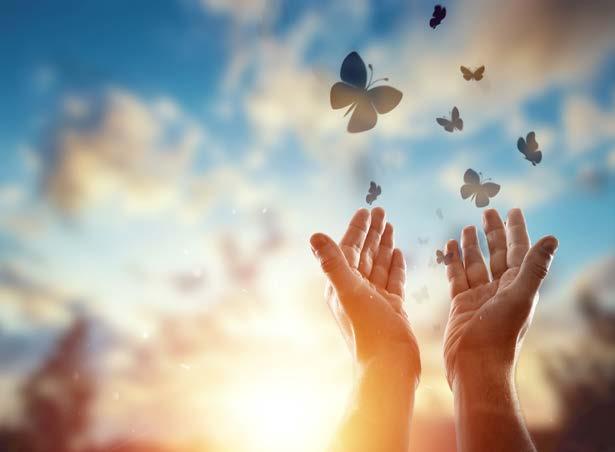
6 minute read
Grief from the mouth
BY ROSA CARRAFA
‘I am an orphan. I survived my change of environment throughout adolescence. I battled my way through the confusion of romantic relationships in my 20’s. I held my ground as a sole parent in my 30’s. I ached the changes of my womanhood that were occurring in my 40’s. I am today in my 50’s - acknowledging who I am because of the woman I was yesterday, that is leading me to forward and become the woman I will be tomorrow.’
Advertisement
Iam proud of being a woman, who addresses openly an aspect of life that many find uncomfortable – death. Death is a wonderous thing, just as birth is. I do not celebrate in death, however, I respect that it is the life cycle that can change how we perceive each moment in life.
My personal experience with death was one that I could not find anywhere else in modern times. I haven’t met anyone, aside from my siblings and family who have lived to tell their story of one much like mine. I am sharing a fragment of myself in this area of my personal life experience, in a this very short article, in hope that it may touch another’s life. My hope that it may fill your moments of being unheard, unloved, unsafe and alone - with instead feeling a sense of belonging in an inclusive life club, made up of magnificent girls who became women through the fortuitous happening of death that shaped their lives.
Writing and re-writing this piece has been challenging for me to condense, as I have so much to contribute in this area. I write and speak unashamedly about this aspect of life because it comes naturally to me – I sat no exam, nor learnt from the finest academic scholars in the globe. I woke one morning, kissed my mother, father and brother for what was then the last time.
At the age of 14 years old, my life as I knew it then, from the eyes of an innocent teen revolted and began to metamorphose into one that I was not prepared for – after all, which child and young person will be, right?
Life was more than wonderful for me, I am today and was then – the eldest of four children whom literally in a matter of hours became orphaned. From that hour that changed my life as I knew it – we now went from being a family of six to that of three. I was extremely loved, I was always safe, I was heard and never felt lonely in the safe haven of my family’s comfort. I was free to be me – the curious, outspoken, creative and intelligent girl. Ironically, all those attributes that were once celebrated became the very things that spiralled the opposite direction from that moment death made its presence seen and felt.
I understand this may not be welcomed by all, and one that most individuals shun away. Nevertheless, after over three decades of having death come and take – I today learn from it and make more out of myself as an individual than ever. Today I have become the woman that was suppressed from the moment I became a teen orphan – that young child never left from me. Yes, life is very different for me in comparison to those that my peers have today. What many don’t understand is the child that was forgotten and cast aside became a woman with emotions and struggled in areas of life that my peers haven’t.
Those simple moments of sharing family celebrations, holidays, quality time together over a meal and even sharing a moment of laughter and to watch my parents hold their grandchildren – I missed out on all that. As a result, I am what is clinically described as experiencing acute PTSD. Yes, after a lifetime of remaining silent with my emotions and being on the receiving end of a magnitude of diverse abuse, I am experiencing the elastic band effect. I have been pulled and probed in so many ways in life that I simply cannot be stretched any farther – otherwise, I may break. Today, I have an alternative view in this area, I was never broken – I was grieving.
How do I deal with these emotions today? Each day is very different from the previous. Yesterday, I was curled up in my warm bed and felt numb and immobile. As a women of 52 years old – or young, I am
About the Writer In 1984 at the age of 14 years old, Rosa Carrafa became orphaned, losing 6 members of her family in one road accident. This life event was the beginning of learning about loss - in love, death and the process of grief. As a sole parent of sons, she has gone through life wondering what life would have been like if things were different. Learning to embrace the woman she is today through surviving grief, and menopause without her mother, was an emotional time. All the physical and emotional challenges were experienced with trauma. Rosa has learnt to have a relationship with the woman she has become. As a woman in her 50’s, she is living her passion of being a creative writer, poet, artist, and advocate in the community. Her hope is that through sharing her story, https://rosacarrafapublishing.com.au/
now in my next mysterious cycle of womanhood. I survived the wars of menopause and grieve not only my youth, but the unknowing of how my mother, who was only 35 years old would have experienced this change in her life. The unknowing is overwhelming on my better days, but, oh so tormenting on my days of wanting to be still and hide from the day.
Being an orphan adult is just as lonely as being the orphaned teen that was 2 years in of cycle of womanhood. I remember my mother explaining her best as why my body has changed and in the most conservative way, even mentioned how doing certain activities may be compromised. Well, she was right – of course. I couldn’t live my life without her. That was the very life activity that became compromised. Not my ability to play sport, neither my attending parties nor dancing all night, her – she was compromised in my life. I wanted to ask her so many questions about being a woman as experienced romantic relationships in my 20’s and then being a mother in my 30’s. She wasn’t there to share with me how my woman cycle would affect my emotions it began to diminish and work backwards – perimenopause in my 40’s was just as uncomfortable as the first years of beginning my menstrual cycle in my teens. I was instead, left to my own recourses and read about my changes and listen to then engage in conversations with other women – I learnt about my body through others.












